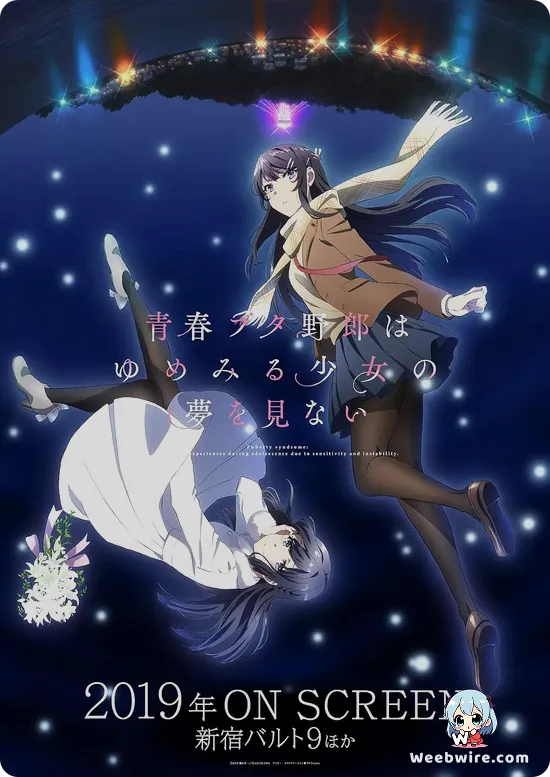

© CloverWorkswww.netflix.com
Rascal Does Not Dream of a Dreaming Girl
Overview
The highly anticipated cinematic continuation, Rascal Does Not Dream of a Dreaming Girl, produced by the acclaimed CloverWorks, plunges viewers deeper into the enigmatic world of Adolescence Syndrome. Set against the serene, yet often surreal, backdrop of Fujisawa, the film rekindles the journey of Sakuta Azusagawa, a pragmatic second-year high school student whose life is inextricably linked to the supernatural. His once-peaceful existence, shared with his beloved girlfriend, the iconic actress Mai Sakurajima—who herself grappled with the bizarre manifestations of Adolescence Syndrome—is thrown into profound disarray by the sudden, bewildering reappearance of his first love, Shoko Makinohara. The narrative unfurls a breathtaking mystery: two distinct versions of Shoko exist. One is a fragile middle schooler, desperately in need of a heart transplant, her life hanging by a thread. The other is an adult Shoko, who appears to have traversed the intricate pathways of time itself. This extraordinary, supernatural twist thrusts Sakuta into an agonizing crucible, forcing him to confront profound themes of memory, the agonizing burden of self-sacrifice, and the intricate, often cruel, interplay of fate and causality. The film masterfully delves into the psychological undercurrents of Adolescence Syndrome, portraying it not merely as a supernatural gimmick, but as a potent metaphor for the intense emotional turmoil and existential crises experienced during puberty, manifesting in truly bizarre and inexplicable phenomena. Renowned for its sophisticated characterization, the movie expertly balances tender romantic tension with intense dramatic depth, primarily focusing on Sakuta’s internal struggle: how can he possibly save Shoko’s life without irrevocably altering the future, and what devastating consequences might this hold for Mai? Through its captivating fusion of drama, intricate psychological elements, heartfelt romance, and evocative supernatural motifs, Rascal Does Not Dream of a Dreaming Girl delivers an emotionally resonant and intellectually stimulating experience that undeniably carves its own unique niche within the genre. The animation quality, a hallmark of CloverWorks' prowess, is exceptional, showcasing meticulously detailed visuals and fluid, expressive motion, which collectively enhance the storytelling and immerse viewers completely into the poignant, often melancholic, and utterly surreal atmosphere of Sakuta's evolving world. <
Opinion
From an editor's perspective, Rascal Does Not Dream of a Dreaming Girl is not merely a film; it's a masterclass in emotional storytelling, building upon the rich foundation laid by its predecessor series. CloverWorks' animation is, simply put, breathtaking. Character expressions are nuanced, conveying deep internal conflicts with subtle shifts, while the atmospheric backdrops of Fujisawa are rendered with a painterly quality that enhances the supernatural realism. The seamless blend of realistic settings with fantastical occurrences is visually arresting, ensuring that the audience is fully immersed in Sakuta's perplexing reality. The voice acting ensemble, particularly Kaito Ishikawa as Sakuta, Asami Seto as Mai, and Kaori Nazuka as Shoko, delivers performances that are nothing short of stellar. Ishikawa’s portrayal of Sakuta’s characteristic sardonic wit, coupled with his profound empathy, is perfectly balanced. Seto captures Mai’s quiet strength and heartbreaking vulnerability with remarkable precision, while Nazuka beautifully navigates the dual nature of Shoko, making both versions feel distinct yet intrinsically connected. The story pacing is meticulously crafted; it allows moments of poignant reflection to breathe, juxtaposed against sudden, high-stakes dramatic climaxes. This careful rhythm prevents the complex narrative from becoming overwhelming, instead creating a compelling flow that keeps viewers on the edge of their seats, emotionally invested in every twist and turn. Character development, particularly for Sakuta, is pushed to its absolute limits as he confronts an impossible moral dilemma, forcing him to grow beyond his already mature demeanor. Thematic depth is where the film truly shines. It’s a profound meditation on self-sacrifice, destiny, and the agonizing choices that define us, all wrapped within the metaphor of Adolescence Syndrome. The film doesn't shy away from the darker aspects of these themes, offering a mature and thought-provoking exploration of love, loss, and the nature of memory. This cinematic masterpiece not only lives up to the series' reputation but elevates it, cementing its place as a standout in the psychological romance genre for its intelligent narrative, exceptional technical execution, and deeply moving emotional core.
Characters
Shoko Makinohara
Voice: Kaori Nazuka
Sakuta Azusagawa
Voice: Kaito Ishikawa
Mai Sakurajima
Voice: Asami Seto
Rio Futaba
Voice: Mikako Komatsu
Credits
Studio
CloverWorks
Cover Art
Illustrated by Keeji Mizoguchi, Art Direction by CloverWorks
Publisher
ASCII Media Works (Dengeki Bunko)
Producers
Aniplex, CloverWorks, Dengeki Bunko
Episodes
Season 1
1 episodesInformation
Genres
Related Anime

Fullmetal Alchemist: Brotherhood

Haikyu!!

Gintama.: Slip Arc

Hajime no Ippo: The Fighting!

Mob Psycho 100 III
